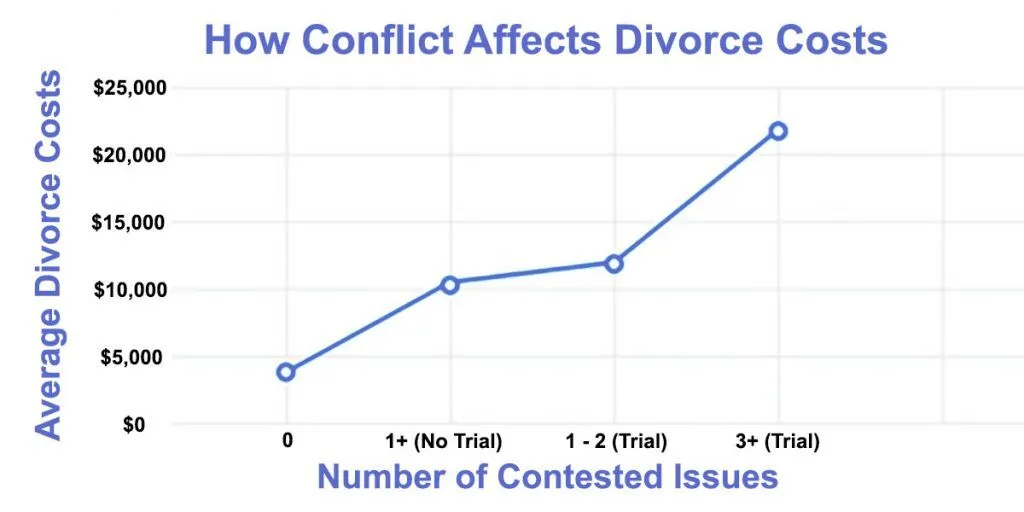A contested divorce in Texas occurs when the parties involved cannot agree on one or several terms of their marriage dissolution. Understanding the nuances of a contested divorce is crucial for the parties involved. It heavily influences the procedures they must follow, the duration of the divorce process, and the emotional toll it may take on everyone. Filing a divorce without a firm grasp of its key considerations can result in unfavorable outcomes, hefty legal costs, and prolonged distress.
Differences Between a Contested and Uncontested Divorce
The primary distinctions between a contested and an uncontested divorce stem from the level of agreement between the parties regarding the major aspects of their separation. In a divorce without a lawyer, both individuals agree on all significant points, such as asset division, child custody and support, and spousal maintenance. This consensus allows for a more streamlined and swift legal process, often without the need for a trial.
On the other hand, a divorce where the parties are at odds is characterized by disagreements on one or more issues, necessitating a court’s involvement to reach a final decision. In this case, it typically involves a longer timeframe, increased legal expenses, and emotional strain due to the adversarial nature of the proceedings.
Common Reasons for a Contested Divorce
One common reason is the division of assets and debts, where spouses cannot reconcile differences about who should receive certain properties or be responsible for incurred liabilities. Child custody is another hotly contested area; disagreements over parenting time and decision-making responsibilities can create significant conflict. Additionally, a difference in financial earnings can lead to disputes over spousal and child support, as the lower-earning spouse may seek a higher amount than the other is willing or able to pay. Infidelity, domestic violence, and fundamental differences in values or life goals are also factors that may contribute to a divorce become contested. Each of these issues introduces complexities into the divorce process, often requiring legal intervention to resolve.

The Texas Contested Divorce Process
While the dissolution of marriage cases varies, they follow a series of steps:
- Filing the Petition: The process begins when one spouse files a legal petition for divorce in district court, stating the grounds and initial request for court intervention.
- Response: The other spouse has a specified time to file a response to the divorce papers, which may agree with or dispute the details laid out by the petitioner. If the spouse does not respond to the divorce papers, the court may grant the spouse who filed the petition a default judgment.
- Temporary Orders: The court may issue temporary orders outlining how custody and finances will be handled during the divorce.
- Discovery: During this phase, parties request and disclose all pertinent information related to assets, finances, and other relevant matters through various legal tools.
- Negotiation and Mediation: Before trial, parties often negotiate or mediate to resolve their differences and reach a settlement agreement. Learn more about divorce mediation requirements in Texas.
- Trial: If negotiation and mediation fail, the case proceeds to trial, where a judge hears arguments from both sides and decides on all contested issues.
- Final Decree: The court’s final judgment or order closes the case and sets out the divorce terms, including asset division, custody arrangements, and support.
Alternative Dispute Resolution
In Texas, individuals seeking a contested divorce must participate in alternative dispute resolution (ADR) before proceeding to trial. ADR methods, such as divorce mediation, encourage parties to agree outside of court with the guidance of a neutral third-party mediator.

This approach aims to reduce the strain and expenses of lengthy litigation while promoting positive resolutions through open communication and compromise. Other forms of ADR in Texas include arbitration and collaborative law, both offering alternative avenues to reach a mutually acceptable settlement.
The Role of Child Custody
Child custody is often one of the most contentious issues in a contested divorce. In Texas, the family court considers the child’s best interests when determining parenting time arrangements, considering factors such as the child’s safety, stability, and emotional well-being.

Sometimes, the court may appoint a child custody evaluator to assess each parent’s ability to provide for their offspring and make custody recommendations based on their findings. Having an experienced attorney advocating for your rights and interests in family law and a parenting plan is crucial.
Child Support in a Contested Divorce
In Texas, determining child support in the context of a contested divorce is governed by state guidelines that are designed to ensure the best interests of the children are met. The financial implications for the supporting spouse are significant. They are typically based on a percentage of the payer’s net income, considering the number of children requiring support. The rate is usually 20% of the net income for one child. This is intended to cover necessities such as food, shelter, clothing, and additional costs related to the child’s education and healthcare needs.

In contested cases, if the parents cannot agree on the support amount, the decision is left to the court. The court may order a higher or lower payment than the guideline amount, depending on various factors such as the child’s needs, the custodial parent’s income, and the payer’s ability to pay. Beyond child support, the dispute may extend to spousal support, especially when earnings disparity exists. The court may order this payment after either temporary orders or a final hearing.
Property Division
The state’s community property laws influence the division of assets and debts during a contested divorce in Texas.

Couples facing a contested divorce must resolve the complex task of dividing their joint assets and determining responsibility for their debts while attempting to protect separate property belonging to one spouse. Things can get more complicated and become more contested when you have a high asset divorce or prenuptial agreement.
Related Guide: What Am I Entitled to in a Divorce in Texas?
Spousal Support in a Texas-Contested Divorce
Texas courts may award spousal support, known as alimony, during a contested divorce. Alimony is considered based on the duration of the marriage, the ability of a spouse to support themselves, and any history of family violence, among other factors. The methods of spousal support payment can vary, encompassing lump-sum or periodic payments or even a property transfer, depending on what the court deems just and equitable.

While Texas law does have provisions for spousal maintenance, obtaining such support is not automatic and is subject to strict eligibility requirements. It is crucial for both parties to understand their financial rights and obligations to address these issues effectively and reach an equitable resolution
Legal Representation
Seeking the expertise of a contested divorce attorney holds immense value, especially in a contested scenario. An experienced family law attorney will not only guide you through the complexities of the divorce process but also strive to protect your interests.

From selecting the right attorney to understanding how to work with a lawyer throughout your case effectively, legal representation could be pivotal in the outcome of your contested divorce in Texas.
Settlement vs. Litigation
Deciding whether to settle or litigate can be one of the most significant decisions in a divorce case. While settlement can offer a more amicable resolution and may be less expensive and quicker, sometimes litigation is necessary to ensure a fair outcome.

Understanding the benefits of negotiation and mediation is essential, as these can often lead to a settlement outside of district court, reducing the emotional and financial costs associated with traditional litigation. Litigation may become necessary when parties cannot agree and require a judge’s intervention to reach a resolution.
Choosing the Right Divorce Lawyer
A divorce is typically more complicated if it is contested. However, a contested divorce in Texas can be made easier with an experienced divorce law lawyer from Warren & Migliaccio. We have the knowledge and background to guide you through the process, advocate for a positive result, and help you move forward in the next chapter of your life. Our compassionate yet relentless attorneys work swiftly as they fight to preserve your property and your parental rights.
Each couple and family has a unique set of circumstances. To fully understand your situation, we offer potential clients a free and discrete consultation with an experienced divorce lawyer. For legal help information on Call our law office at (888) 584-9614.
